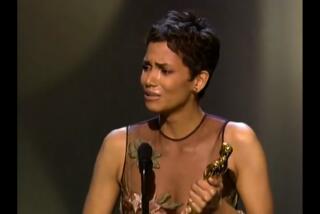Harvey Weinstein and Scott Rudin are at it again at the Oscars
There are many roads to Oscar. But perhaps the surest ones lead through the offices of two moviemakers responsible for 31 of this year’s Academy Award nominations, including those of the two best picture front-runners, “The King’s Speech” and “The Social Network.”
With brash personalities and refined tastes in film, producer Scott Rudin and studio head Harvey Weinstein represent an endangered species in an increasingly buttoned-up, corporate Hollywood. In a cinematic era in which studio films are driven by superheroes and sequels, they champion ostensibly uncommercial movies — about an awkward king who stutters and a jerky kid who starts a website — and, through a mixture of strategy and alpha behavior, fight to win them audiences and Oscars.
Both are expert at the business of collecting little gold men. Over the last two decades, Weinstein’s movies have earned 287 Academy Award nominations and 63 wins while Rudin’s have notched 104 nominations and 13 wins. With the Academy Awards four weeks away, these Oscar rainmakers are launching the final salvos in their campaigns.
Rudin and Weinstein aren’t friends — and have butted heads on previous projects — but they share a grudging respect for each other’s work and an awful lot in common. Both native New Yorkers from Jewish families — Rudin, 52, grew up on Long Island and Weinstein, 58, in Queens — the two keep their offices 3,000 miles from Hollywood on the island of Manhattan, Rudin in midtown and Weinstein in Tribeca. Both men are prone to leaving voice mails and e-mails for their colleagues at 5 a.m. and are known for abrasive managerial styles. Rudin devours more scripts on the weekends than the rest of his nine-person staff combined, and Weinstein brokers deals at Sundance in the middle of the night. Both men also work outside of movies — each has seven Tony Awards for theater productions, and each has dabbled in television. Both have beards and fluctuating waistlines.
“Really, they’re the same person,” says Donna Gigliotti, a producer who worked with both Weinstein and Rudin on a tense production of “The Reader” and is now the Weinstein Co.’s head of production. “They’re both incredibly smart, committed to telling interesting stories and I don’t think either of them ever sleeps.”
On Tuesday, Weinstein’s “The King’s Speech” collected the most Oscar nominations, 12, and his “Blue Valentine” one. Rudin’s “The Social Network” netted eight nods and “True Grit” 10, making him the first producer since 1974 to earn two best picture nominations in one year.
Screenwriter Aaron Sorkin recalls flying to New York in 2009 with his first draft of “The Social Network” for a meeting with Rudin. The producer had hired Sorkin in 2008 after seeing Sorkin’s short-lived Broadway play, “The Farnsworth Invention,” about the first days of television. In Rudin’s mind, that made Sorkin a great choice to write about the first days of Facebook, even though Sorkin had little knowledge of the website. Sitting in the conference room of Rudin’s modern, theater district offices, “we’d do what he calls ‘turning pages,’” says Sorkin, who is nominated for an Oscar for his screenplay. “We went through the whole thing page by page, line by line. I’d go back to my hotel and I’d polish it and by the end of the week we delivered it to the studio. He was the first person to make the script better.”
As “The Social Network” progressed through production and into theaters, controversy erupted over the film’s truthfulness. Rudin shielded Sorkin and director David Fincher and kept their focus on their creative work, while he juggled the competing interests of the studio’s marketing department, its legal team and the objections by Facebook founder Mark Zuckerberg, according to Amy Pascal, co-chair of Sony Pictures Entertainment, which is distributing the movie.
“He looks at every ad, he looks at every quote, he looks at every clip, he looks at every daily. He looks at every bit of film. He’s involved in every single detail of every film that has to do with him,” says Pascal. “And he does it from the vantage point of a producer, meaning he has to get it done by the force of his will.”
Weinstein can be similarly hands-on. At about the same time Rudin and Sorkin were powering through Sorkin’s script, director Tom Hooper, who had mainly worked in television, and 73-year-old screenwriter David Seidler, whose immediately previous credit was the TV film “Kung Fu Killer,” were in London, despairing of finding a backer for their proposed movie about British King George VI’s effort to overcome a debilitating stammer with the help of an eccentric speech therapist. Despite its offbeat premise — or perhaps because of it — Weinstein embraced the film.
“The creation of this awkward man into the king of England in a time of war fascinated me,” says Weinstein. “The friendship of the two unlikely participants transformed a nation in a time of need. It was big storytelling with a small human interest.”
The executive signed on to produce the project with multiple British partners, Weinstein says, for a thrifty $12 million. “In a world where lots of people were hedging their bets, he had tremendous passion. He was hugely decisive,” says Hooper. In perhaps the most fateful decision for a film that often consists of two men exchanging dialogue in a room, Weinstein enlisted Colin Firth to play the king opposite previously cast (and co-producer) Geoffrey Rush. He also lined up Helena Bonham Carter to play Firth’s queen. Firth is being hailed for the performance of his career and all three actors got Oscar nominations Tuesday.
“Harvey is my fairy godfather,” says Bonham Carter, who received her last Oscar nomination for “The Wings of the Dove,” a 1997 production by Weinstein’s former company, Miramax. “He breaks you out in this rash of nominations. I’m happy to have the rash. He just better not wait another 12 years to cast me in something.”
Beyond the creative process, Rudin and Weinstein excel on the awards season campaign trail, a talent that not only wins statuettes but endears them to the creative community and draws audiences to challenging films.
“When the Academy Award puts an imprimatur on it, people say, ‘Wow, that’s quality, it must be good,’ and they’re more adventurous in their choices,” says Weinstein in explanation for his relentless pursuit of Oscar gold.
Oscars are such a ritual at Weinstein’s house that the executive, a father of four daughters (the youngest is 5 months and the oldest 15) and husband to designer Georgina Chapman, keeps his children out of school to watch the nominations with him on the “Today” show.
Weinstein was behind perhaps the biggest Oscar upset of recent years when his frothy, 16th century comedy about creativity, “Shakespeare in Love,” captured the 1998 best picture award over Steven Spielberg’s World War II epic, “Saving Private Ryan.” That stunner still rankles some in Hollywood today and helped make Weinstein the most feared operative on the Oscar campaign trail.
Weinstein says his guiding philosophy is to get his movie seen by all of the academy’s 6,000 far-flung members, and he makes it his business to know how to find every one of them.
Gigliotti remembers being on the “Shakespeare” campaign and having Weinstein turn to her and ask, “Has Red Buttons seen the movie?”
“I said, ‘Harvey, I think Red Buttons is dead.’ He said, ‘He’s not dead. He lives in Palm Springs, he’s represented by the Morris Agency, make sure he sees the movie,’” she said.
If Weinstein is the flamboyant showman, Rudin works the Oscar circuit just as hard, if more covertly.
“You can definitely say Scott got our movies [‘True Grit’ and ‘No Country for Old Men’] into the Oscar race,” says Ethan Coen. “He does so much, and part of it we understand.” Adds brother Joel, “And part of it we’re happy to not understand. That’s the part of the process we’re more than happy to let Scott deal with.”
Both men push their stars and directors through the relentless march of press events, parties, screenings and personal appearances that mark the November-through-February awards season. Rudin convinces actors like “The Social Network’s” Jesse Eisenberg, who stammers awkwardly through interviews, that their promotional efforts are in the service of the movie. “Scott’s the only reason I left my apartment as frequently as I have over the last several months,” says Eisenberg, calling from the set of “Saturday Night Live” as he readies his first hosting duty for the late-night sketch show. “When I first met with Scott on the movie and we talked about the potential for the campaign, he sensed my hesitancy and assured me I wouldn’t be signing autographs in a flea market.”
Neither Rudin nor Weinstein finished college and both are industry wunderkinds. As teenagers, Rudin worked for a Broadway producer and Weinstein and his brother, Bob, started a concert promotion business. The Weinsteins founded their first film company, Miramax, in 1979, when Harvey was 25; Rudin became president of production at 20th Century Fox in 1986 at age 27. Rudin spent 15 years at Paramount Pictures, where he produced commercial hits like “School of Rock” and “Clueless” and specialized fare such as “The Truman Show” and “Wonder Boys.”
In 2005, Disney forced out the Weinsteins at Miramax, and they went on to start the Weinstein Co. The company stumbled and nearly sank. Many in Hollywood began writing Weinstein’s obituary as a creative force. But last year Weinstein had a timely hit (and Oscar nominee) in Quentin Tarantino’s “Inglourious Basterds,” and “The King’s Speech” has completed his comeback.
Meanwhile, Rudin, whose longtime companion is theater publicist John Barlow, departed Paramount for Disney, where he essentially became Weinstein’s replacement as the major supplier of the company’s prestige pictures. It was there that his work on Oscar pictures proliferated and his relationship with filmmakers such as the Coen brothers was cemented.
Rudin and Weinstein have collaborated on a few projects along the way, including “Marvin’s Room” in 1996 and “Iris” in 2001. The two type-A personalities often clashed, but it was during their partnership on “The Hours” in 2002 that those disagreements first became public. They argued over everything from whether Nicole Kidman should wear a prosthetic nose (Rudin won and she did) to whether the movie should go the Venice International Film Festival (Weinstein won and it didn’t).
After the film was finished, Rudin sent Weinstein, who was trying to quit smoking, a carton of cigarettes. On “The Reader” in 2008, Rudin and Weinstein battled again, so severely that Rudin removed his name from the film, which went on to earn a best picture nomination and a win for Kate Winslet’s performance as an illiterate concentration camp guard.
This year the two find themselves on the road to Oscar once again, with films that have become both critical and commercial successes. It is not on movies, however, that they relate.
“We talk about weight a lot,” says Rudin, who declined to participate in this story except to offer this comment. “That’s always been the common subject, much more than movies. How fat are we at any given time. One of us is always fat, one is thin. That’s the currency of our relationship.”
More to Read
The biggest entertainment stories
Get our big stories about Hollywood, film, television, music, arts, culture and more right in your inbox as soon as they publish.
You may occasionally receive promotional content from the Los Angeles Times.







